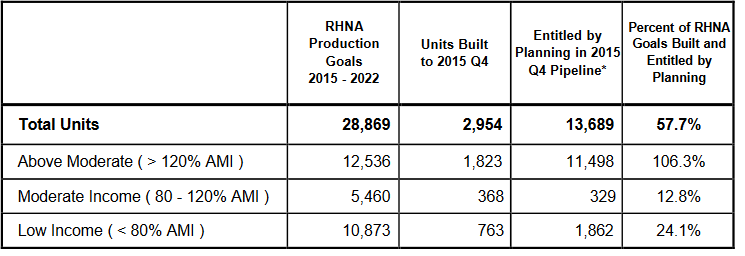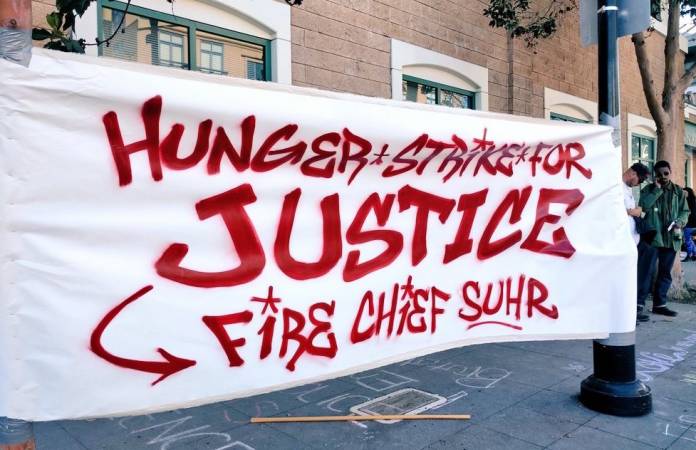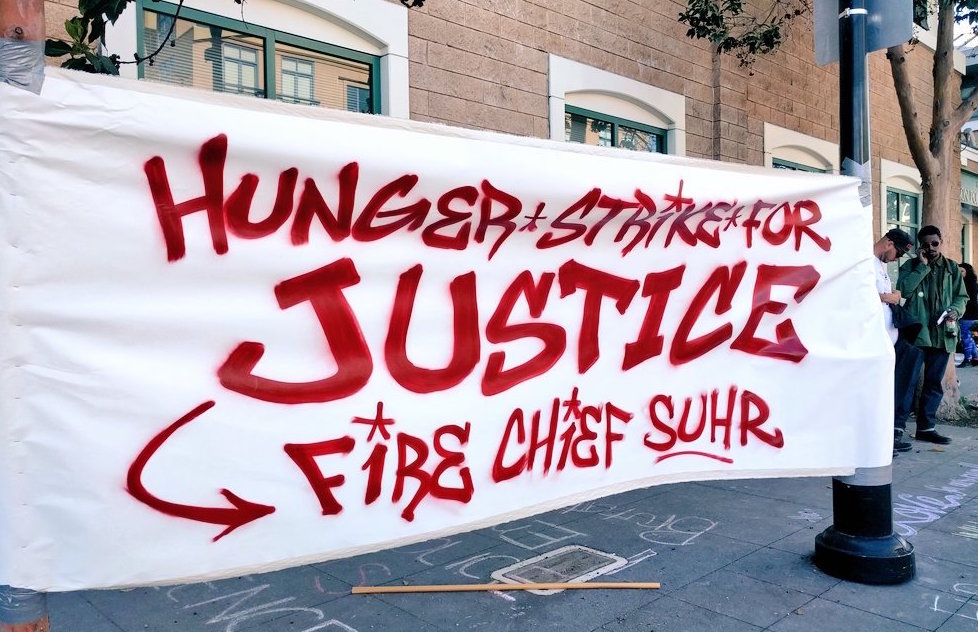The hunger strike for police accountability is now well into its second week, and still not one word – seriously, not one word – from the mayor. He has made no effort to contact people who are putting their lives on the line (not eating for 10 days or more is really serious). Meanwhile, the national and even international press is paying attention.
So Tuesday/3 the strikers are going to City Hall to demand a meeting with Ed Lee. They will most likely travel in wheelchairs, with what I expect will be a sizable crowd of supporters marching along. You have to wonder if the mayor will do what he typically does when protesters come to see him: He keeps the door to his office closed and guarded and either hides inside or hides offsite.
The mayor is pretty much hiding all the time right now; everywhere he goes, he’s met with angry protests.
The march will gather outside the Mission police station around 12:30pm and expect to be at City Hall at 2pm. The Mayor’s Office has issued no comment on where he will be at the time.
In the current climate of police violence – and more important, of a complete lack of accountability – it’s hard to see how introducing Tasers will be anything but a disaster. Yeah, the chief says that his officers can use the stun guns instead of shooting people and that they would follow strict rules. But right now, the biggest problem in the Police Department is that officers violate the existing rules, with impunity – and as long as that’s the culture, the idea of giving the officers another potentially lethal weapon (and yeah, Tasers can be lethal) is, to say the least, alarming.
But this plan moves forward, with the support of the chief and the mayor, and will be on the agenda for the Police Commission Wed/4. The commissioners aren’t going to vote on the concept for at least another month, but this is the start of what will be a lengthy public-hearing process.
I talked to Paul Henderson, who is a deputy chief of staff and criminal justice advisor for Mayor Lee, and who is also running for judge, and asked him about Tasers. He said he’s “not for or against Tasers.” He said that “everything should be on the table” and it’s a “wonderful conversation,” but that a new weapon should be added only in the larger context of police use of force and rebuilding trust with the community.
But a lot of people think any discussion of Tasers should be off the table right now. And that’s what the Police Commission is going to hear from a lot of activists. They’ll also hear from the POA, which wants Tasers, but which is so totally discredited now that it’s hard to see how anyone can take its suggestions seriously.
(Check out the latest POA newsletter for a hint at how the union sees the situation on the streets. First there’s an attack on District Attorney George Gascon for not sending more people to jail for minor crimes. Then there’s a totally chilling section on use of force rules (got to page 21) that suggests the POA has no clue at all about how terrified and upset communities of color are about the way cops treat them.)
You probably didn’t know that the City and County of San Francisco has its own paid lobbyist. But that’s been the case for years – the city spends a nice chunk of cash paying someone to represent SF interests in Sacramento.
So what are “SF interests?” It’s a good question.
Obviously, there are bills that impact the ability of cities to raise and spend money, and there’s arcane stuff about the creation of local agencies, and there are groups like the League of California Cities that work on these things.
But there’s also a lot of state legislation that the people who run the city might not like, but that the people who live in the city think is a great idea. A lot of that involves open-government policies – it’s been an open (so to speak) secret for decades that the worst opponents to new state sunshine laws are the cities and the counties. I started writing about this in 1986, when we exposed “The Secrecy Lobby” in Sacramento – and it turned out to be mostly funded by your tax dollars.
In fact, the San Francisco city lobbyists was working against open-government laws, on behalf of a shadowy committee that is supposed to decide SF’s position on state legislation.
So all of this is about to come out in the open Thursday/5, when the Government Audit and Oversight Committee holds a hearing on the issue. Sup. Aaron Peskin has asked that the city attorney, the city’s lobbyist, and the mayor’s legislative liaison show up and explain exactly how these decisions are made, who makes them, and what the standards ought to be.
It’s seems obscure, but it’s not: For example, how hard is the city fighting for State Sen. Mark Leno’s bill on police accountability, which the cops hate? Where is the city on all of the various bills that would make life easier for Uber and Airbnb? Who decides what the city’s position ought to be on these bills anyway?
The meeting starts at 9:30am, City Hall Room 250.
That same committee will be talking about legislation by Sups. David Campos, John Avalos, and Eric Mar mandating that the city open at least six new navigation centers for the homeless within the next year. It’s part of the obvious, ongoing battle over how San Francisco treats homeless people; Avalos has introduced a bill saying that the city can’t shut down tent cities and evict people until there’s a place for those residents to go. Campos has been pushing the mayor to expand the (generally) successful navigation center model.
The new centers will cost money, but less than the city currently spends dealing with the impacts of homelessness.
Since 1984, San Francisco has had rules against building highrises that shadow public parks. Now, though, the needs of the new Transbay Center seem to, as they say, overshadow that. The giant tower planned for that site will cast shadows on at least four city parks. But that’s okay – we are funding all of the infrastructure in this city not by raising taxes but by giving away parcels to developers.
The Planning Commission is going to address this Thursday/5, when the entire Oceanwide Center is up for approve. And the commission staff recommends that the project by okayed. When we are selling our skyline, even the parks aren’t safe.
The commission will also hear a report from the planning director on the latest “housing dashboard,” which shows how much the city is building of all the sorts of housing that planners agree we need.
The report is as depressing as usual: The city is building more luxury housing than we need, and a lot, lot less moderate-income and low-income housing. The item is scheduled as a simple report, no action – but it’s more than that. It’s a warning that ought to be taken as a complete indictment of this administration’s housing policy.
Check out the numbers here:

We need no more luxury condos. We need a lot more low- and moderate-income housing. But the more market-rate we build, the further we get behind. (In the best case scenario, 100 luxury units get us a mix of 25 low-and moderate-income units. That means 75 percent of the new housing goes into the category that is already over built, and only 25 is split between the areas that are radically under built.)
And you wonder why there’s a housing crisis.








